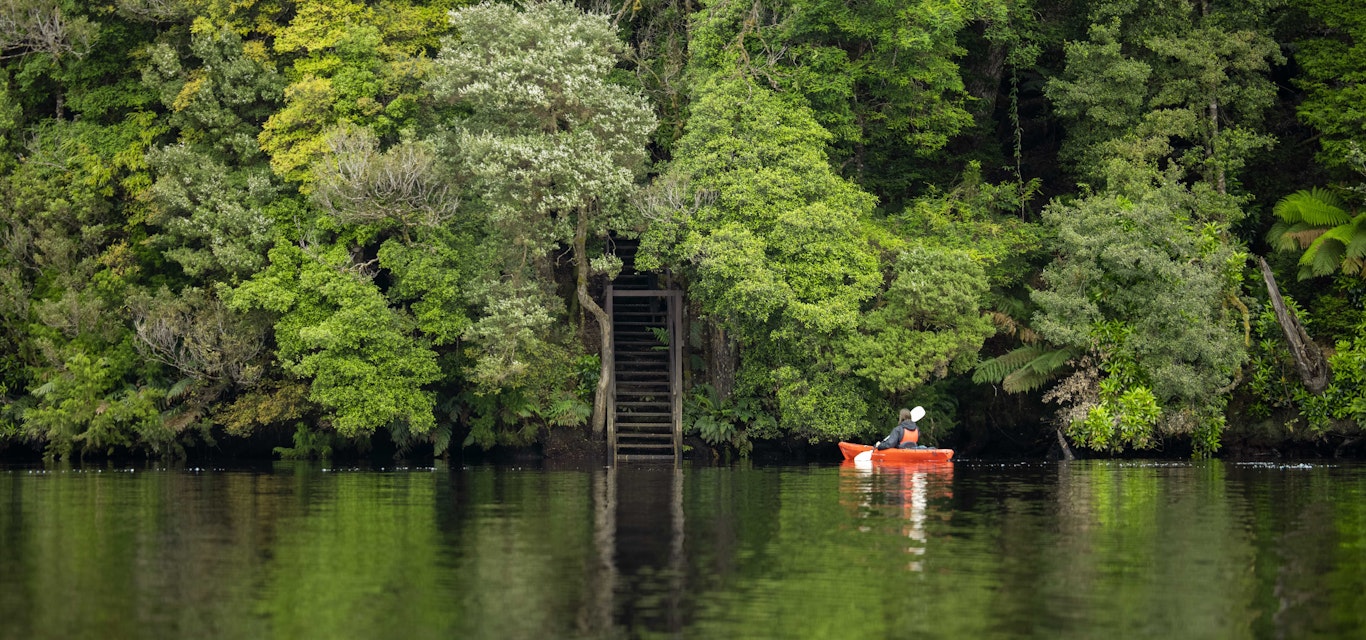Stay in the moment: Tasmania’s unplugged holidays
Sometimes the best connection is no connection at all. From Southport’s sea-glass beaches to Corinna’s wild rivers and Binalong Bay’s rock pools, these unplugged holidays invite you to look up, slow down and be truly present.
Maddie Gasparinatos’ favourite holidays are the simple ones where her young family head somewhere where phone signals drop off. The Huon Valley mum and co-host of the gardening podcast Avant Gardeners says her top spot is Southport, the little fishing village where she grew up.
“The kids can ride their bikes, we can spend hours at this little beach we call Treasure Beach just finding sea glass, we walk to the boat ramp and see what people have been bringing up on the cray or abalone boats, or we just look for fish,” she says. “It’s so wholesome.”
Away from screens, the family “mellows out”, says Maddie.
“I think we’re more playful," Maddie says "We’re just a better family when we’re like that.”
Another favourite spot of hers is the former goldmining town of Corinna in Tasmania’s north-west, accessed by barge across the Pieman River.
“The place is spectacular,” she says. “Corinna is like a one-pub town – not even a town, it’s one pub with all these old huts – and if there’s anywhere in Tasmania where the Tasmanian tiger exists, it is around there. You just feel enveloped by Tasmanian wildlife and wilderness.”
Credit: Jess Batheram/Wild Road Wanderers
Similarly, Binalong Bay on the north-east coast is another spot where Maddie says the family are simply content.
“It’s one of the most delightful parts of the world,” she says. “The kids look at rock pools and jump on rocks and discover shark eggs, and you see these amazing sunsets and sunrises.
“I think just by virtue of having no reception, you look up and out and are more observant.”
Credit: Tourism Tasmania/Flow Mountain Bike
Daniel Sih is an award-winning author of books including Raising Tech-Healthy Humans, a TEDx speaker and a productivity expert. He co-hosts the Spacemakers podcast and, along with his wife Kylie, is raising three teenagers in southern Tasmania.
Like many of us, he spends most of his working hours interacting with technology in various ways and says that holidays should give us a break.
“We are on the internet for, on average, 9.4 hours a day: that’s an enormous neuroplastic load on the brain,” he says.
Disconnecting from screens and devices regularly is good for our brains, he says. It’s also good for strengthening connections with people we love.
“The three benefits I see with unplugging are deep rest, deep thought and deeper relationships. I’m not anti-tech, but I think it’s super important and helpful to be able to reconnect.
“We talk about disconnecting to reconnect with people face to face, where we’re fully present, where we are listening and making eye contact, even being a bit bored together. Disconnecting allows you to slow down, rest together and communicate.”
When it comes to the impact of excessive tech use on children, teenagers and families, Daniel says kids are missing out on valuable experiences: “Riding bikes, climbing trees, playing music, spending time with friends, playing board games, doing jobs, creative arts – it all basically reduces in exchange for the phone.”
Tasmania is an ideal travel destination for those wanting to escape the relentlessness of digital life, but Daniel says it’s getting harder to find places with absolutely no coverage or access. His family holidays twice a year at Piccaninny Point above Bicheno, which used to have no coverage – until a tower was built.
“But that doesn’t mean I don’t have internet-free or internet-reduced holidays,” he says. “I just leave my phone in my car. If we go bushwalking together, I’ll turn it off and I’ll keep it in the bag, just in case I need reception for safety. If I’m going to the shops, I’ll use my phone to purchase stuff, but then I’ll put my phone away in the car again.”
It requires a certain level of self-discipline to keep phone use to a minimum, he says – but it’s worth it.
“I think as families go away and unplug, we’re broadening the experiences of our family’s life again. And why bother going on holidays if you’re not going to do that?”
Credit: Tourism Tasmania/Lisa Kuilenberg
Ideal off-grid locations for unplugged holidays:
Far from any hustle or bustle, this Central Highlands off-grid accommodation was once a fisherman’s shack and has the slogan “unplug but make it photogenic”.
Like so many Tassie camp sites, this one at Cloudy Bay puts you right in the middle of nature. Right down the bottom of South Bruny, it boasts tall trees, beaches and a lagoon, fishing opportunities, surfing breaks and even flushing toilets. It’s family- and dog-friendly, and wonderfully has no phone coverage.
An off-grid property at Lady Bay in the far south of Tasmania, Elements is a passive solar rammed-earth and timber home with views across the southern D'Entrecasteaux Channel and South Bruny Island. Stop, unplug and enjoy the sea eagles, swift parrots and seaside.
Taking on Australia’s premier alpine walk may seem a drastic way to force yourself to disconnect, but it works. Six (or more) days of immersion in spectacular nature and physical exertion will change you. Bonus: you’ll have to climb a serious mountain to have a chance at finding a snippet of reception.
Hike the Great Western Tiers, see the Great Lake, wander through heritage-listed rainforests or just sit and relax by the firepit at this cosy and rustic off-grid cabin at Jackeys Marsh.
The music at this new passive solar off-grid home five minutes from Cygnet comes via CDs - rather than Spotify. There’s also a solar-heated rainwater bath at the 20-hectare bush-and-pasture property that also boasts a large permaculture garden.
